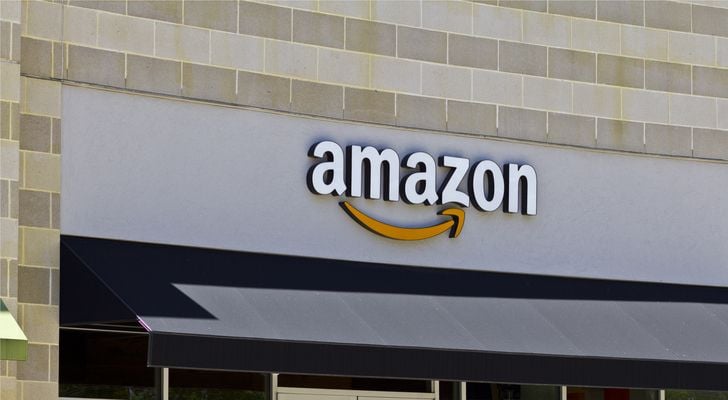Wondering when Amazon (NASDAQ:AMZN) is going to hit $1 trillion is so 1980s. Just $90 billion away from $1 and nine zeros, AMZN stock needs to increase $184 or 9.8% to become only the second public company to hit the exclusive market cap.
It’s in the bag.
No, the logical question is to ask when Amazon will hit $2 trillion.
And even though the headline says I’ll be giving you my predicted date for success, I’ve learned from past dalliances with date-based predictions, that I’m usually wrong — by a lot.
So, instead, I’ll consider what Amazon might look like as a company when it does hit $2 trillion.
A Conglomerate Not Unlike Berkshire Hathaway
When articles first started popping up in the business media a few years ago talking about Amazon, the conglomerate, you knew it was only a matter of time before it actually became one.
Quartz contributor Shelly Banjo said this about Amazon in April 2015:
[CEO Jeff] Bezos’ empire-building is totally out of step with the frenzy of high-profile corporate breakups occurring of late, including General Electric‘s (NYSE:GE) sale of its finance and appliance units and PayPal’s split from eBay. The surge in corporate spinoffs comes as shareholders and activist investors like Nelson Peltz and Carl Icahn make the case that these businesses are worth more separately than together.
You know you’re a conglomerate, or at least conglomerate-like when activist investors start calling for a company’s breakup.
In 2016, Investor’s Business Daily ran a piece about digital conglomerates like Amazon. In 2017, the New York Times’ Andrew Ross Sorkin called the company a “new-economy conglomerate” and, in 2018, Loose Threads, a website about the new consumer economy, argued that Amazon is definitely not a conglomerate.
“Amazon, at its core, has evolved into something much more amorphous than a conglomerate: the world’s first true, industry-agnostic Platform Ecosystem,” Loose Threads argued in February. “It uses its technology and capital allocation to invest in and dominate more industries than any other company.”
While it’s true that Amazon is indeed a platform company — it made my list of 7 Platform Stocks to Buy in April — there is new evidence to suggest that the company is morphing into something similar to Berkshire Hathaway (NYSE:BRK.A, NYSE:BRK.B).
Here’s Why That’s a Good Thing for AMZN Stock
CNBC technology reporter Eugene Kim wrote an interesting piece Aug. 14 about the company’s growing portfolio of public and private investments.
Kim noted that, in two years, Amazon’s investment portfolio has grown by 163% to $1 billion. Add to this acquisitions such as Whole Foods and Ring and you’ve got the makings of a conglomerate Warren Buffett would envy.
“While Amazon hasn’t in the past really been focused on equity investments, it seems like it’s taking a lot more interest in investing in other companies, both public and private,” said Thomas Ruchti, an accounting professor at Carnegie Mellon University.
A successful conglomerate — a perfect example, other than Berkshire Hathaway, is LVMH (OTCMKTS:LVMUY), run by the world’s fourth-wealthiest person, Bernard Arnault — allocate capital in an efficient manner to grow the overall group of businesses.
Whether through acquisitions, venture capital, public equities, development of new businesses, the Arnault’s and Buffett’s of the world have bigger plans than merely delivering above-average shareholders returns.
They’re always looking to make their existing businesses better by utilizing all the capital allocation levers mentioned above.
Warren Buffett is said to read 5-6 hours a day. One of his two investment managers, Todd Combs, reads as much as 1,000 pages a day, in an effort to find the next great business or trend to make Berkshire Hathaway, the whole, better.
I don’t know how much Jeff Bezos reads, but it’s safe to assume, it’s more than you or I consume on a daily basis. That’s how billionaires become billionaires in the first place.
What’s Any of This Got to Do With a $2 Trillion Market Cap?
Amazon isn’t going to get to $2 trillion by owning 50% or more of global e-commerce.
Why?
Because, unlike Berkshire Hathaway, its e-commerce business is getting too big a piece of one pie, and governments don’t like that. If something doesn’t change at Amazon, it legitimately risks a forced breakup by the U.S. federal government.
So, the way to avoid this fate is to invest in a whole lot of other businesses that are related to what it does in e-commerce, but competing in different industries and sectors of the economy to avoid antitrust regulators.
It might not work, but I don’t see that Amazon has a choice.
Therefore, I expect that when AMZN stock gets to $2 trillion, it will have made a number of bigger acquisitions than Whole Foods.
It has too.
As of this writing Will Ashworth did not hold a position in any of the aforementioned securities.

